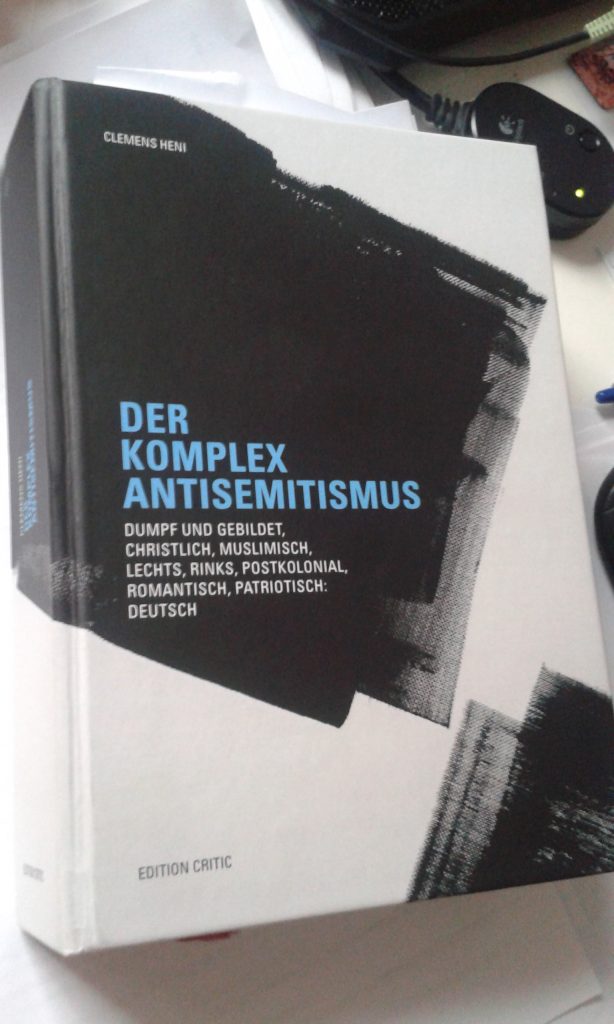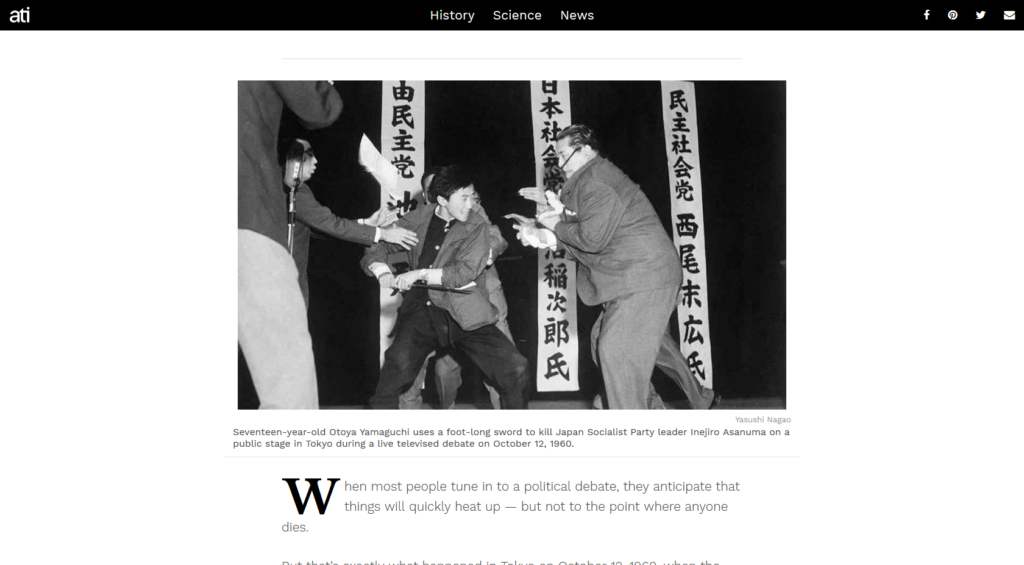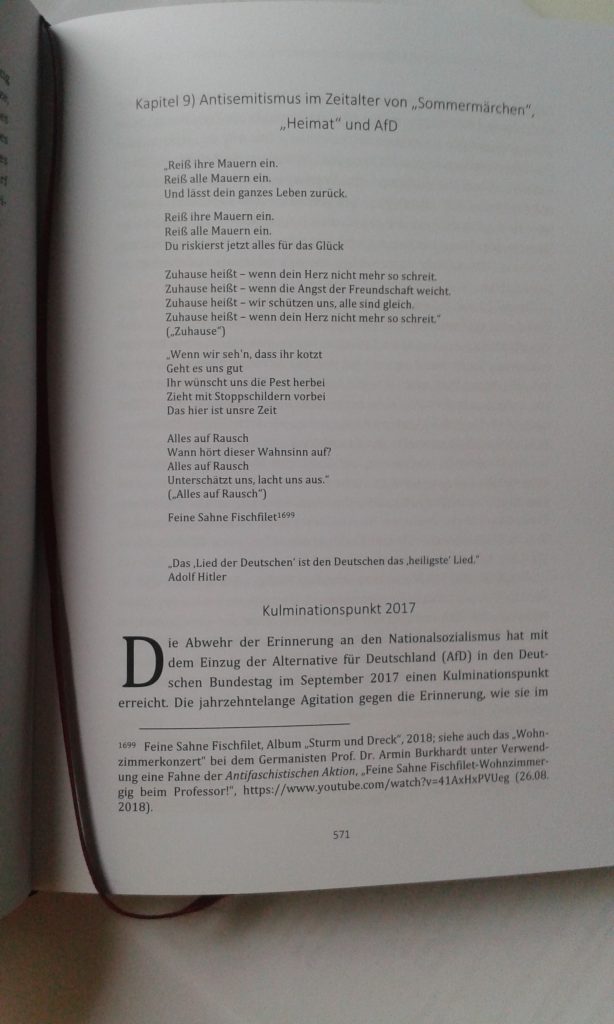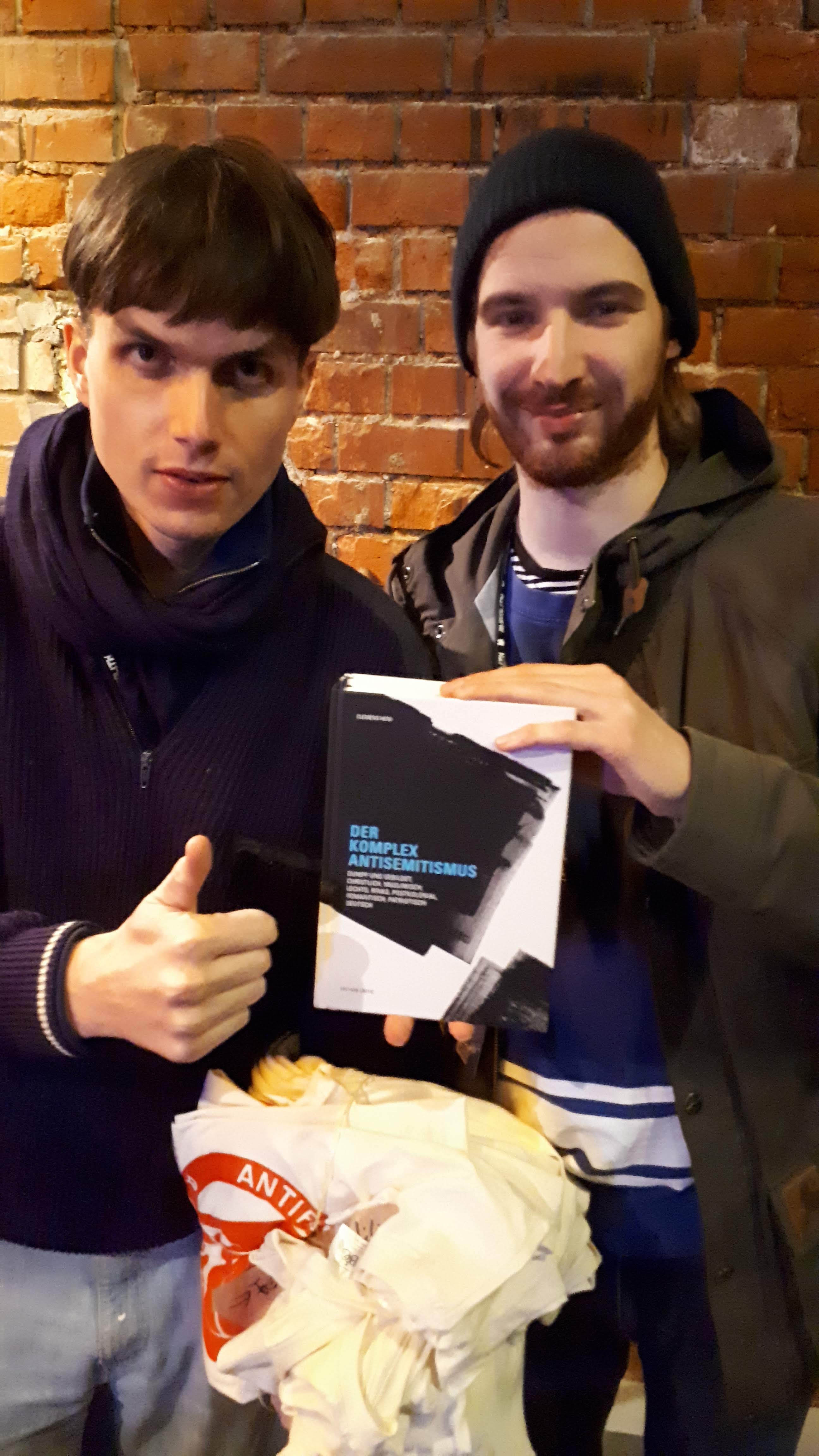Von Dr. Clemens Heni, 10. Dezember 2018
* Update bzgl. Suhrkamp, 11.12.2018
Es gibt eine neue Generation von Juden in Deutschland, die gerade deshalb im nicht-jüdischen Mainstream reüssiert, weil sie mit dem jüdischen Establishment wie dem Zentralrat der Juden und dessen Topoi von Shoaherinnerung und Zionismus bricht.
Bekanntestes Beispiel dafür ist vielleicht Max Czollek. Zwar wendet er sich gegen die Namensgebung „Anne Frank“ für einen ICE der Deutschen Bahn, ohne deren Vorläufer, die Reichsbahn, es weite Teile des Holocaust in der Form nicht gegeben hätte, gegen das deutsche „Gedächtnistheater“, einem sehr angestaubten Begriff von Michael Bodemann, wie auch gegen die Neue Rechte von AfD bis Alexander Dobrindt (CSU) und den Schland-Wahnsinn von 2006. Deshalb braucht es ja eine „Alternative zu Deutschland“ – aber gerade keine Abkehr von der Holocausterinnerung (die manche durch Klamauk ersetzen möchten) und von Israel, wie sie Czollek einfordert.
Czollek ist Jg. 1987, aber sein Duktus ist eine Mischung aus mittelmäßiger Abiturzeitschrift und saturiertem Rückblick eines Wannabee-Bestseller-Schriftstellers in gehobenem Alter. Ernsthaft schreibt der 31jährige Czollek, wie intensiv er die letzten fünf Jahre diskutiert habe, im Vorlauf zu diesem Büchlein im Hanser Verlag.
Völlig zurecht möchte er die deutsche Selbstzufriedenheit mit der Gedenkkultur kritisieren und nimmt sich dabei en passant gerade auch solche guten Deutschen wie Katrin Göring-Eckart (geborene Eckart, was er nicht betont), Anja Reschke oder Richard von Weizsäcker (1985) vor. Das ist alles zwar nicht neu und auch vom Stil her wenig scharf oder provokant, aber nicht falsch. Diese Deutschen sehen sich in der Tat als geläutert an, als die Guten, die auf dem Grundgesetz stehen (oder es gleich als Liebhaber haben wie Reschke) und wirkliche Analyse und Kritik der Gesellschaft nicht kennen.
Doch die kennt auch Czollek nicht. Er erleidet einen völligen Realitätsverlust. Warum? Sein Buch „Des-integriert Euch“ von 2018 tut so, als sei es Mainstream, die Verbrechen des Holocaust zu erinnern. Er sieht gar nicht, dass Altbundespräsident Gauck gerade dies nicht tun möchte, ohne auf die angeblich genauso schrecklichen Verbrechen Stalins zu verweisen, Rot gleich Braun, wie es die von Gauck 2008 unterzeichnete und von Litauen initiierte Prager Deklaration will und bereits sehr tief in der politischen Kultur Europas verankert ist, bis hin zu Resolutionen im Europäischen Parlament. Als Joachim Gauck 2013 als Bundespräsident mit dem Präsidenten Estlands, Toomas Hendrik, in Tallin im „Museum der Besatzung“ vor zwei Säulen posierte, links der Rote Stern des Kommunismus und rechts das Hakenkreuz des Nationalsozialismus, wurde dieser erinnerungsabwehrende und totalitarismustheoretische Antisemitismus als deutsche Staatsideologie unumwunden erkennbar, wie der Holocaustforscher und berühmte Yiddish Professor Dovid Katz festhält.
Nur Czollek sieht das nicht, wie auch fast die gesamte sonstige deutsche Gesellschaft, von den Grünen oder der CDU, SPD, CSU, FDP hin zu den „Berühmtheiten“, die 2012 alle für Gauck in der Bundesversammlung gestimmt hatten, wissend, was für ein Holocaust verharmlosender Mann das ist.
Czollek sieht noch weniger den postkolonialen Frontalangriff auf die Erinnerung an die Shoah, wie er von schwarzen Agitatorinnen wie Imani Tafari Ama in der taz im Juni 2017 herausposaunt wurde:
„Die Europäer müssen anerkennen, dass die Verschleppung der Afrikaner das größte Verbrechen in der Menschheitsgeschichte ist, größer noch als der Holocaust“.
Czollek will offenbar den Judenhass nicht bekämpfen – denn das sei alles Geschwätz und zudem das Geschäft des Zentralrats der Juden, der so etwas wie der Hauptfeind für die jung-deutschen Juden wie Czollek zu sein scheint. Und schon gleich gar nicht möchte er den Antisemitismus von „Marginalisierten“ wie Schwarzen oder Türken, Arabern und Muslimen bekämpfen – denn das sind eher seine Partner*innen.
Völlig affirmativ bezieht er sich hingegen auf die hardcore Israelfeindin Judith Butler, auch Hannah Arendt wird nonstop zitiert, dazu kommen dann ebenso ungebildete und nur antilinke Ressentiments schürende antisemitische Zitate, wie von Karl Marx, ohne zu analysieren, dass Marx seinen Text „Zur Judenfrage“, der sehr problematisch und in der Tat antisemitisch ist, später, wie im Kapital von 1867, wieder zurücknahm, die Personifikation des Kapitalismus auf Juden war im Hauptwerk von Marx gerade kein Thema mehr. Aber solche wissenschaftlichen Differenzierungen fehlen bei Czollek vollkommen. An ihm scheinen Debatten über Antisemitismus allein der letzten 20 Jahre völlig spurlos vorbeigegangen zu sein. Und das ist kein Zufall, sondern gewollt.
Zwei Aspekte stechen besonders hervor bei diesem vor Narzissmus triefenden Büchlein Czolleks: die Abwehr der Holocausterinnerung und das Kuscheln mit islamistischen Muslim*innen.
So schreibt er angesichts des Gedenkens an den 8. Mai:
„Bei der nächsten Gedenkveranstaltung sehe ich sie wie schon so oft nebeneinander, die Deutschen auf der einen, die Juden auf der anderen Seite. Doch statt das gewohnte Ritual zwischen den zerknirschten, aber geläuterten Deutschen und den trauernden Opfern zu inszenieren, wird diesmal das Stück der jüdischen Sieger und der unterlegenen Deutschen aufgeführt. Einer der Juden beugt sich zu einem Deutschen hinunter, streichelt ihm über den Kopf und sagt: Aber am Ende haben wir den Krieg gewonnen!“
Die Rote Armee hat den Krieg gewonnen, die Juden haben ihn verloren. Die wenigen Juden, die in der Roten Armee zu den Befreiern von Auschwitz gehörten, werden doch dadurch nie im Leben zu Siegern.
Paradoxerweise trifft sich Czollek an diesem Punkt mit Henryk M. Broder, dessen Realitätsverlust so weit geht, dass er vor Jahren an einem 27. Januar israelische Flugzeuge über Auschwitz fliegen sah – obwohl noch nie an einem 27. Januar israelische Kampfjets über Auschwitz flogen. Broder möchte Israel als die Reaktion und Konsequenz zu Auschwitz sehen, was aber fehl geht: der Zionismus ist viel älter und hat rein gar nichts mit Auschwitz zu tun. Darauf weisen in Israel viele zionistische Forscher*innen und Publizist*innen seit Jahren hin.
Czollek findet jedoch gerade die anti-israelischen Israelis, die nach Berlin strömen, so richtig cool, vermutlich auch jene, die z.B. 2010 in der Jüdischen Gemeinde zu Berlin Randale machten und die Antizionistin Iris Hefets mit ihrem vulgären Antisemitismus in der taz („Pilgerfahrt nach Auschwitz“) unterstützten. Auch die russischen Juden mag Czollek, da sie nicht so herkömmlich und „Gedächtnistheater“ spielend seien wie die meisten deutschen Juden (wie der Zentralrat der Juden) und weniger an Auschwitz erinnerten (das sei eh alles Heuchelei), sondern an den Sieg der Roten Armee über die Deutschen.
Sein ganzes Verkaufsmodell basiert auf seinem ach-so-dissidenten Jude-Sein (denn nur „Berliner“ oder „Lyriker“ oder gar typisch zionistischer deutscher Jude zu sein, das würde sich nicht verkaufen) – hört sich bitter an, und ist bitter. Analytisch bringt er nichts Neues (er schreibt im Wesentlichen von Michael Bodemann, dem frühen Broder oder von Arendt und Butler ab).
Er lehnt den Zentralrat der Juden mehr oder weniger ab und findet Israel problematisch oder einfach kein Thema für ihn und die neu-deutschen jungen Juden, die eher mit Muslim*innen kooperieren denn mit jüdischen Zionist*innen.
Damit kommt Max Czollek natürlich im Mainstream von ZDF-Kulturpalast, Deutschlandfunk und allen Feuilletons hervorragend an. Dabei hat die Deutschlandkritik, jene am Schland-Wahnsinn von 2006 bis heute, wie auch an den Stolzdeutschen, die gerade die Erinnerung an die Shoah feiern, nach dem Motto „So schnell macht uns Auschwitz und vor allem die Erinnerung daran, niemand nach“, von Richard von Weizsäcker über Norbert Lammert bis Cem Özdemir, nicht auf einen postzionistischen Autor gewartet.
Der andere Aspekt, der das nicht nur desolate, sondern nun auch wirklich gefährliche Niveau der Czolleks unserer Zeit indiziert, ist sein Bezug auf Muslime. Für ihn war der Antisemit Heinrich von Treitschke bereits ein Feind auch der Muslime. Czollek fordert eine „jüdisch-muslimische Leitkultur“. Kein Wunder also, dass er die den Islamismus verharmlosende oder mit ihm kokettierende und offenbar pro-BDS Muslimin Yasemin Shooman vom (Anti-) Jüdischen Museum Berlin[i] in der ach-so-wahnsinnig-jung-deutsch-jüdischen Hauspostille „Jalta“ publiziert (die sich hinter die vom Verfassungsschutz wie anderen Islamismusexpert*innen und dem Antisemitismusbeauftragten der Jüdischen Gemeinde zu Berlin kritisierten Neuköllner Begegnungsstätte stellt) und sein Kumpel Micha Brumlik ist einer der Co-Herausgeber.
Der Generation Czolleks Selbstverliebtheit zeigt sich dann auch in seinen Lobeshymnen auf das Maxim Gorki Theater (das beim Karneval der Geflüchteten mit dabei war, so wie auch eine BDS-Gruppe dabei war, alle wussten es und haben es goutiert).
Schon auf dem Backcover von „Desintegriert euch“ macht sich der Autor über die Kritik am Islamismus lustig und diffamiert geradezu Juden, die sich mit der Shoah und dem Antisemitismus befassen. Damit bedient er die antiisraelische und Holocaust verharmlosende Obsession des nicht-jüdischen deutschen Mainstream. Für die überwiegende Mehrheit der Juden außerhalb Israels spricht er ganz sicher nicht, denn die ist erstens zionistisch und zweitens in sehr großer Sorge ob des extrem zunehmenden Antisemitismus in den letzten Jahren, vor allem in Europa, aber auch in den USA. Der Trumpismus steht für eine politische Kultur, die Gewalt und Judenhass heraufbeschwört und zum schrecklichsten antisemitischen Massaker in der Geschichte Amerikas in einer Synagoge in Pittsburgh führte.
Israel ist und bleibt die rettende Insel für alle Juden (gerade auch der ungläubigen oder gottlosen, die aus ihrer Identität nichts Besonderes machen, sondern einfach nur als Jude oder Jüdin sicher im eigenen Staat leben wollen), auch wenn das die Czolleks nicht wahrhaben wollen und darauf pfeifen.
Max Czollek meint ernsthaft, er kritisiere das „Gedächtnistheater“ in Deutschland – er hat einen Realitätsverlust und sieht gar nicht, wie seit Jahren die Rot=Braun-Totalitarismusideologen, die postkolonialen, schwarzen und sonstigen Leugner*innen der Präzedenzlosigkeit der Shoah agitieren und er ignoriert vollkommen die enorme Gefahr, die vom muslimischen wie islamistischen Judenhass ausgeht. Dieser muslimische Judenhass und Antizionismus findet nicht nur auf deutschen Schulhöfen, in Moscheegemeinden, im BMW- oder Mercedes-Autoradio oder im öffentlichen Raum und dem Internet statt, sondern auch in der Publizistik und teils sehr einflussreichen Institutionen. Gerade NGOs, die sich der jüdisch-muslimischen Symbiose verschrieben haben, die vorgeblich besser halten solle als die Chimäre der christlich-jüdischen oder gar das Phantasma der deutsch-jüdischen, sind doch Teil des Problems und kein Hoffnungsschimmer, wie Czollek suggeriert.
Das absolut Angesagteste sind also jüdisch-muslimische Kooperationen, weil beide angeblich ähnlich marginalisiert seien. Dabei gab es in der Bundesrepublik noch nie eine so riesige und extrem starke Gruppe von Einwanderern wie die Muslime, wobei viele erst spät zu solchen wurden, viele kamen als säkulare, Arbeit suchende Menschen wie aus der Türkei oder als Flüchtlinge aus Bosnien und wurden später, aber umso brutaler islamisiert oder islamisierten sich selbst und ihre Familien. Viele Muslime wollen gar nicht Teil der Gesellschaft sein, verschleiern sich, lassen sich obsessiv Bärte wachsen oder ihre Kids nicht mit „Ungläubigen“ zu Hause spielen – dazu kommt der althergebrachte Rassismus der Mainstream-Deutschen, von Pegida bis AfD und dem viel älteren west- wie ostdeutschen Rassismus.
Czollek hat offenbar am Zentrum für Antisemitismusforschung (ZfA) der TU Berlin promoviert. Dass der dortige frühere langjährige Leiter zwei Jahre, nachdem er das letzte Mal seinem Doktorvater, einem treuen Hitleranhänger, öffentlich zum Geburtstag gratuliert hatte, Direktor jenes Zentrums wurde und seine Nachfolgerin wie Czollek den Antisemitismus (wie des frühen 19. Jahrhunderts, für Czollek und Wolfgang Benz des späten 19. Jahrhunderts bis zur Shoah) mit der „Islamophobie“ analogisieren, passt ins Bild. Hat sich Czollek je mit den Antisemitismus verharmlosenden oder Islamismus befördernden Tendenzen am ZfA befasst? Oder ist das nicht exakt seine „Liga“?
Das Buch „Des-integriert Euch“ ist keine „gesellschaftliche Polemik der Stunde“, wie der Hanser Verlag das Buch anpreist. Es ist ein erfolgreicher Versuch eines Juden gerade damit zu reüssieren, sich gegen Juden zu stellen und den Antisemitismus, der 2018 so stark ist wie seit Jahrzehnten nicht mehr, nicht nur zu verharmlosen, sondern zu unterfüttern mit einem knallharten postzionistischen Narrativ, wie es im Soziologendeutsch heißen würde.
Selbst seine vorgebliche Kritik an Deutschland ist maximal halbgebildet. NS-Verharmloser und Anti-68er wie Götz Aly oder der die Deutschen zu Opfern eines Luft-„Vernichtungskriegs“ wie die Juden der Shoah imaginierende W.G. Sebald sind seine Zeugen, was wiederum unterstreicht, wie wenig Czollek von der heutigen wissenschaftlichen und publizistischen Kritik am Antisemitismus mitbekommt.
In einer Zeit, in der eine rechtsextreme Partei im Bundestag und allen Landesparlamenten sitzt, die in nie dagewesener Form gegen die Erinnerung an den Holocaust mobil macht, das Holocaustmahnmal in Berlin ablehnt und somit weiten Teilen auch des Bürgertums, des dumpf-deutschen, aus der Seele spricht, zu fordern, das typische Holocaustgedenken (bei Czollek nach dem Motto „Nicht-jüdischer Journalist fragt jüdische Künstlerin über ihre Familie“…) eher lächerlich zu machen, zeugt das von besonderer Cleverness oder doch eher von einem gravierenden Realitätsverlust, wie Freud diagnostizieren würde? Ein Verkaufsschlager ist es allemal im neuen Deutschland.
In Zeiten, wo Schulklassen mit muslimischer Mehrheit gar nicht über die Shoah reden wollen und die Lehrer*innen sich unfähig oder unwillig zeigen, das durchzusetzen, zu fordern, dass die Erinnerung eh der völlig falsche Weg sei und es um das ach-so-lustige popkulturelle, Battle-Rap-postzionistische Judentum im 21. Jahrhunderts gehen solle?
In Zeiten, wo universelle Werte von Kulturrelativist*innen abgelehnt werden, sich gerade an muslimische Gruppen oder Tendenzen anschmiegen? In Zeiten nach 9/11, wo der organisierte Islamismus so stark ist wie nie zuvor, von antisemitischen Ideologemen über den Kopftuchzwang, die Erdogan- und AKP-Vergötterung, der Liebe zur Muslimbruderschaft und dem abgrundtiefen Israelhass des heutigen Iran hin zum ubiquitären Antizionismus weiter Teile der deutschen Gesellschaft wie der islam- und nahostwissenschaftlichen Studiengänge an deutschen Universitäten?
Wenn die Czolleks die Zukunft der Juden in Deutschland sind, dann lachen der Jihad und der Islamismus herzlich. Für die Czolleks unserer Zeit sind nicht der Jihad und Islamismus oder die Nazis und die Dinner-Party-Antisemiten von München-Bogenhausen das Problem, sondern jene, die weiterhin darauf hinweisen, dass in Auschwitz sechs Millionen Juden ermordet wurden und die Juden die Opfer des Zweiten Weltkriegs sind (und Juden nicht die sowjetischen Sieger sind), und die sich mit aller Kraft gegen den Israelhass weitester Teile der deutschen Gesellschaft stellen.
Czollek und all die anderen jung-deutschen, postzionistischen Juden stehen für ein häufig postpubertäres Rumgehopse, linke Gesellschaftskritik, die zweifellos immer mit Religionskritik (ergo auch radikaler Islamkritik) zusammengeht, stört dabei nur. Und genau deshalb ist Max Czollek in Deutschland so erfolgreich.
Wenn die Generation der Czolleks wirklich etwas gegen dieses Land und gegen „Integration“ hätte, würde sie nicht obsessiv nach ihrer Identität und dem je neuesten, postmodernen, antiuniversalistischen Hype Ausschau halten, der antizionistischen Judith Butler oder dem totalitarismustheoretischen NS-Verharmloser Götz Aly frönen, der zwischen der Attacke auf den Springer-Konzern 1968 und der antijüdischen Bücherverbrennung vom 10. Mai 1933 keinen Unterschied sieht (und die Frankfurter Rundschau druckte es), oder andere problematische Identitäten wie die ach-so-zarte „jüdisch-muslimische Leitkultur“ pushen, sondern würde vielleicht eher Helene Fischer und ihre Millionen seicht-affirmativen Fans in Frage stellen und den Suhrkamp Verlag* Gremliza zitieren:
„Integration? Ich bin so frei, von dieser Scheißkultur nichts wissen zu wollen. Deutschlands Werte gehen mir allesamt am Arsch vorbei, ich singe keine Hymne, folge keiner Flagge, werden einen Teufel tun, auf das Grundgesetz, diesen Waffenstillstandspakt im Klassenkampf (Rosa Luxemburg), eine Eid abzulegen, und wünschte mir, jeder Mensch, der hierher geflohen ist, seine Haut vor unseren Exportwaffen zu retten, wäre so frei, es zu halten wie ich.“[ii]
[i] Shooman organisierte für das Jüdische Museum Berlin im Sommer 2018 u.a. eine Veranstaltung mit dem BDS-Aktivisten Sa’ed Atshan, einem Palästinenser aus Ost-Jerusalem bzw. dem Westjordanland, der in USA lebt, die dann zwar aufgrund von Protesten der israelischen Botschaft abgesagt, aber de facto nur verlegt und mit dem gleichen Setting wo anders veranstaltet wurde, vgl. dazu Clemens Heni (2018): Der Komplex Antisemitismus. Dumpf und gebildet, christlich, muslimisch, lechts, rinks, postkolonial, romantisch, patriotisch: deutsch, Berlin: Edition Critic (The Berlin International Center for the Study of Antisemitism (BICSA), Studien zum Antisemitismus, Band 7), S. 445–451.
[ii] Hermann L. Gremliza (2016): Haupt- und Nebensätze, Berlin: Suhrkamp, S. 146 f.
* Konkret 11/2018 schreibt: „Das Kleine Blaue Buch ist nicht mehr im Handel. Im Frühjahr bat Gremliza den Verlag, in dessen Edition Suhrkamp seine Haupt-und Nebensätze gerade in zweiter Auflage erschienen waren, anlässlich der Versicherung der Geschäftsführung, der Autor Uwe Tellkamp, der sich zu Pegida bekannt hatte, werde weiterhin bei Suhrkamp verlegt, um Auflösung des Vertrags. ‚Ich wusste, bevor er ein Fall zu werden sich entschloss, nicht, wer oder was ein Tellkamp ist. Nun, da ich es leider weiß, werde ich jene selbstverständliche Distanz zur sympathy for the Nazi markieren, die der Verlag vermissen lässt, und fordere dessen Geschäftsführung hiermit auf, der einvernehmlichen Lösung des Vertrags mit mir zuzustimmen.‘ Der Verlag stimmte zu, die noch nicht verkauften Exemplare der zweiten Auflage gibt es ausschließlich bei konkret.“
©ClemensHeni




